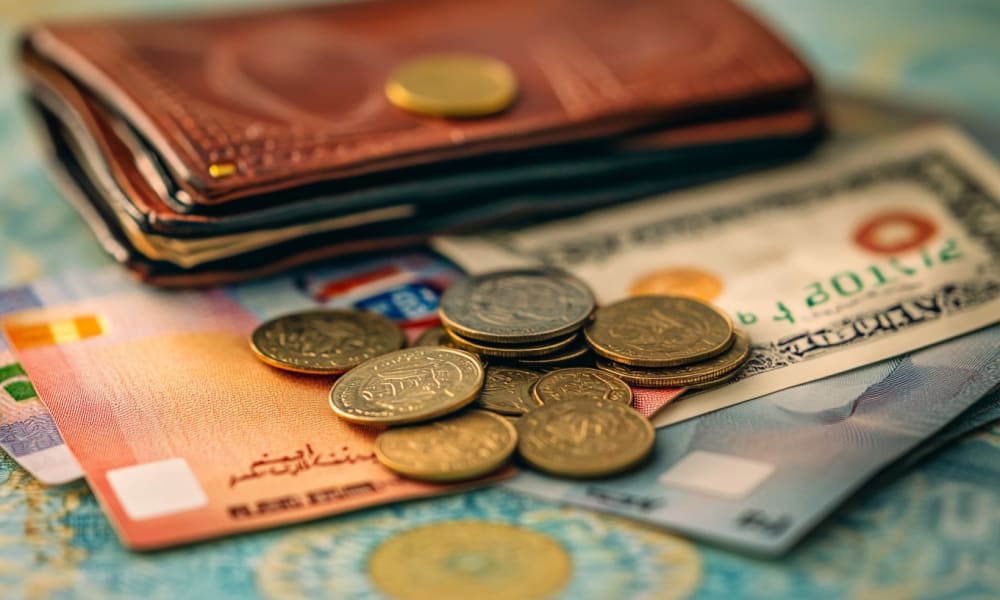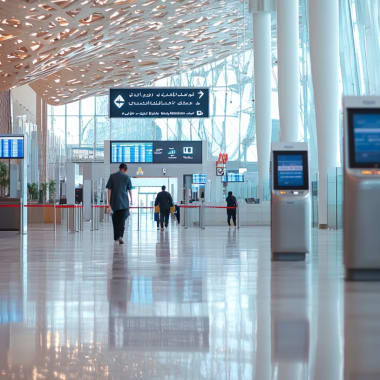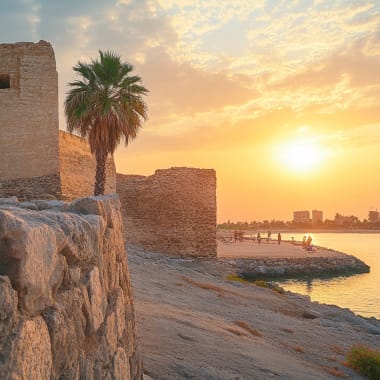
Currency and payment options in Bahrain
What you should know before your trip
What you should know before your trip
A well-prepared approach to money is a crucial factor for a relaxed and safe trip – this applies to Bahrain as well. Whether you explore the fascinating islands as a tourist or attend business meetings in Manama as a business traveler: knowing the local currency conditions and understanding which payment methods are sensible when can help you avoid unpleasant surprises.
Especially in a country like Bahrain, where foreign exchange regulations are strictly governed and cashless payments are widespread, taking a closer look at the available options is worthwhile. The following article is therefore specifically aimed at individual travelers – whether for leisure or business – who want to plan their stay well. It provides a comprehensive overview of Bahrain's currency, common payment methods, fees, safety aspects, and practical tips for daily life.
Bahrain's official currency
For a relaxing stay in Bahrain, it is beneficial to know the local currency and its peculiarities well in advance. Those who are informed about the right currency, available denominations, and current exchange rates can travel not only safely but also cost-effectively. This is particularly important in a country like Bahrain, which has clear foreign exchange regulations and where payment transactions are strongly oriented towards stability.
Bahrain's currency unit and current exchange rates
Bahrain's official currency is the Bahraini Dinar, internationally designated by the abbreviation BHD. The Arabic symbol is .د.ب, while the term 'BD' is commonly used in Western languages. One Dinar is subdivided into 1,000 Fils. The Bahraini Dinar is one of the most stable currencies worldwide and has been firmly pegged to the US dollar since 2001. The official exchange rate is 1 USD = 0.376 BHD – equivalent to approximately 1 BHD = 2.66 USD.
In relation to the Euro, the rate is more variable: Currently (as of Spring 2025), travelers can expect to receive about 2.26 to 2.46 EUR for 1 BHD, depending on the provider. Those seeking accurate conversions should use reliable sources like XE.com, Wise.com, or Finanzen.net before or during their trip – ideally in combination with a travel bank or credit card offering fair exchange rates.
Banknotes and coins in Bahrain
Payments in Bahrain are made with banknotes and coins in various denominations. Coins of 5, 10, 25, 50, and 100 Fils are in circulation, as well as banknotes in values of ½, 1, 5, 10, and 20 Dinars. The banknotes significantly differ in color and size, making them easy to handle.
Cash is essential for smaller expenses – such as taxi rides, purchases in markets, or small shops. Therefore, it's advisable to always have some small change readily available. Additionally, knowing the applicable conversion rates helps avoid unnecessary extra costs and keeps you well prepared for spontaneous expenses.
Currency exchange and cash availability
A smart approach to cash is one of the most important aspects of successful trip preparation – especially in a country like Bahrain, which has clear foreign exchange regulations and where card payment is not possible everywhere. Knowing where to exchange money most favorably and which cards work at which ATMs can save fees and ensure payment capability even in less touristy areas.
Exchanging money in Bahrain
Bahrain offers various options for exchanging foreign currencies into the local currency, the Bahraini Dinar (BHD). Currency exchange offices like Travelex, which accept Euro, US dollars, and other common currencies, can be found directly at Manama Airport – convenient for arrival but usually with less favorable rates. Significantly better terms are available at banks and exchange offices in the cities, especially in the capital, Manama. These are usually open on weekdays, so some planning is advisable.
Larger hotels also exchange common foreign currencies, but often charge additional fees or offer worse rates. Travelers' checks are only redeemable in exceptional cases – for instance, at the Bahrain Financing Company – and are no longer considered a recommendable option. It is important to know: The import and export of Bahraini Dinar is prohibited. Although foreign currencies can be imported without restriction, they must be declared at customs and can only be exported up to the declared amount.
Availability and use of ATMs
Cash availability through ATMs in Bahrain – especially in cities like Manama – is excellent. International credit cards (Visa, Mastercard, American Express) and debit cards with Maestro or Cirrus logos typically work without issues. The ATMs can be found in banks, shopping centers, and central locations, often accessible 24/7 and usable in English.
The fees for withdrawals depend on the card type and your home bank: With debit cards (EC cards), fees of between 5 and 10 Euros per transaction often apply. Credit cards usually charge a foreign usage fee of 1.75 to 4% of the withdrawal amount. A free alternative is offered by special travel credit cards, which allow you to withdraw cash worldwide without fees. Tip: Decline the option of converting into Euros when withdrawing cash at the ATM – the offered rate is often less favorable than your bank's actual exchange rate.
In rural areas, the density of ATMs is lower. While ATMs are generally available in tourist centers outside Manama, small villages may have limited access. Therefore, it’s a good idea to take enough cash with you in advance. Generally, a combination of cash, credit, and debit cards ensures maximum flexibility and security during your trip.
Use of credit and debit cards
In Bahrain, cashless payments are widespread – especially in cities, hotels, and larger shops. However, travelers should keep an eye on acceptance limits and the fee structure to avoid unnecessary costs. Credit cards are considered particularly convenient and safe, while debit cards complement well in certain areas. Those who cleverly combine their payment methods remain flexible and prepared – even for spontaneous expenses.
Accepted credit cards
Visa and Mastercard are the most widely accepted in Bahrain and can be used almost everywhere – whether in hotels, restaurants, shopping malls, or car rental companies. American Express and Diners Club are accepted but less frequently. Travelers using credit cards should expect a foreign usage fee of 1.75% to 4% of the invoice amount, depending on the bank and card plan. The exchange rate used also varies – typically set by the respective credit card company. Those who frequently pay by credit card should check before their trip whether it is worth applying for a travel credit card with favorable conditions.
Use of debit and EC cards
International debit cards such as Visa Debit, Debit Mastercard, or cards with Maestro or Cirrus logos typically function well at ATMs in Bahrain – provided the appropriate logo is visible. Cash withdrawals are made via PIN entry and are particularly widespread in cities like Manama. However, fees between 1.75% and 4% as well as 5–10 Euros per withdrawal usually apply. The German EC card with V Pay function, on the other hand, is not accepted in Bahrain, and cashless payment options in retail with classic EC cards are severely limited. For more security, it is better to use credit or modern debit cards with Visa or Mastercard functionality for purchases.
Special card products for travelers
For frequent travelers and individual vacationers, using special travel credit cards is advisable. These often offer the advantage of being able to withdraw cash worldwide for free or make payments in foreign currencies without fees – a clear advantage compared to conventional bank cards. Such cards are particularly useful for longer stays or frequent use abroad. Prepaid credit cards can also be a sensible addition, as they clearly limit the budget and carry less risk in the event of loss. Important: Before your trip, it is worthwhile to compare the conditions – ideally focusing on foreign usage fees, exchange rates, and security features.
Payment methods and methods for specific purposes
Not every everyday situation while traveling can be handled with the same payment method – this also applies in Bahrain. Depending on whether you are traveling by bus, strolling through a traditional market, or visiting an upscale restaurant, preferred payment methods vary significantly. Therefore, it is worthwhile to gain an overview in advance of when cash is indispensable and where credit cards or modern payment options make sense.
Use of payment methods in public transport and markets
Cash payments still dominate public transport in Bahrain. In buses, you either pay directly to the driver or use a rechargeable ticket, which automatically debits the fare upon boarding. Fares start from 0.300 BD – small change in Fils is particularly helpful here. Cash is also common in taxis, where the fare is usually negotiated in advance, especially for shared taxis. App-based services like Uber are also widespread and convenient in Bahrain: Payment is made directly through the registered credit card.
Those wishing to shop in one of the traditional souks should also rely on cash – small amounts in Fils or Dinars make shopping much easier. While some shops now accept credit cards, it’s not advisable to rely on that. In more touristy areas, a debit card may work as long as it is linked to international payment systems like Visa Debit or Mastercard. Nonetheless, cash remains the preferred method for everyday purchases, small souvenirs, or street sales.
Traveler's checks as a payment method
Traveler's checks play a minimal role in the current payment landscape in Bahrain. While they are still occasionally accepted – for instance, at the Bahrain Financing Company in Manama – redeeming them is often cumbersome, involving wait times, fees, and unfavorable rates. In hotels, restaurants, or shops, they are generally no longer accepted.
Additionally, their availability is severely restricted: In many countries, including Germany, traveler’s checks have not been available for years. Although they were once popular for their theft security, modern credit and debit cards offer comparable security with significantly higher convenience. If you still want to carry traveler’s checks, consider them only as an emergency reserve – not as a primary payment method.
Safety and practical tips for handling money
A safe approach to money is essential when traveling – even in a relatively safe travel destination like Bahrain. The clever combination of various payment methods, being vigilant when withdrawing cash, and a few basic rules of conduct help to avoid fraud or losses. If you observe some simple precautions, you can enjoy your stay in Bahrain in a relaxed and carefree manner.
Cash safety and storage in hotels
In Bahrain, it is advisable to carry only as much cash as actually needed – such as for taxi rides, purchases at the souk, or smaller expenses in restaurants. Larger amounts should be deposited in the hotel safe, along with travel documents or reservation prints. Cards and cash should never be stored together – keeping them in separate locations minimizes the risk of theft or loss.
When withdrawing cash from ATMs, it is better to rely on machines in banks or shopping centers rather than freestanding devices. Look for unusual attachments or signs of tampering and always enter your PIN discreetly. It is also worthwhile to keep your bank's emergency contact number handy to act quickly in case of an emergency.
Regional differences in cash usage
While you can easily pay with a credit or debit card in cities like Manama, a different picture emerges in more remote areas. Here, cashless infrastructure is often less developed, and many smaller shops or vendors do not offer card payment. ATMs are also found less frequently outside the cities – particularly when traveling in rural areas, you should plan to carry enough cash in advance.
Individual travelers looking to discover authentic Bahrain away from tourist centers especially benefit from timely information on local payment options. Solid preparation not only ensures flexibility on the go but also provides a sense of security – no matter where your journey takes you.
Financial planning and transfers
Good financial preparation is a central part of any trip planning – especially when traveling abroad. For Bahrain, it is worthwhile to take a close look at your budget, payment methods, and transfer options. This way, you can avoid unpleasant surprises on-site and ensure that you travel flexibly, safely, and cost-effectively. Whether it’s about everyday expenses at the souk or international money transfers: Being prepared saves time, fees, and nerves.
Planning expenses for your stay in Bahrain
When budgeting for a trip to Bahrain, it is advisable to calculate the expected expenses in Bahraini Dinar (BHD). For smaller expenses – such as in taxis, markets, or small shops – cash is essential. However, credit cards are the preferred payment method in hotels, upscale restaurants, and larger stores. Debit cards like Visa Debit or Mastercard Debit also usually work well, especially at ATMs with the appropriate logos.
Be aware of possible fees: Credit card payments abroad often incur a foreign surcharge of 1.75 to 4%, while cash withdrawals can carry additional fixed costs. A travel credit card with free withdrawals is therefore recommended. For maximum flexibility, it is advisable to carry at least two payment methods – such as a credit card and a debit card – and to inform yourself about card usage and withdrawal limits abroad with your home bank before your trip.
International money transfers and exchange rate issues
If you need to transfer money to Bahrain during your trip – either for support from family members or for business purposes – various options are available to you. Classic bank transfers via SWIFT are secure but comparatively expensive and slow. Faster and usually cheaper are specialized money transfer services like Wise, XE, Remitly, or Western Union. These providers offer better exchange rates and more transparent fee structures than many banks. Particularly convenient: Many transfers can be processed online or via app, sometimes even in real-time.
However, consider potential exchange rate risks. With longer transfer times, the rate can change between sending and receiving the money, leading to unexpected losses. Many providers also add fees to the official exchange rate – so taking a close look at the rate details is worthwhile. For larger transfers or business payments, it may be sensible to use services with rate fixing ('Forward Contracts') to minimize currency risks. Those who act flexibly, quickly, and fee-consciously also remain financially secure.
Cultural aspects of handling money
In addition to practical information about currency and payment methods, travelers should also be aware of the cultural customs surrounding money. In Bahrain, politeness, discretion, and respect play a significant role in financial transactions – whether tipping, paying in markets, or dealing with service providers. Embracing local norms not only leads to a friendlier reception but often also to more attentive service.
Cultural practices in financial transactions
Tipping is part of the service culture in Bahrain. In restaurants, hotels, or for taxi rides, 10% of the bill amount is customary – unless already included in the bill. Smaller amounts for room service or porters are also appreciated. While tipping is not mandatory, it is expected and seen as a sign of appreciation.
When shopping at traditional markets (souks), bargaining is an integral part of the culture. A respectful tone and friendly persistence are vital for successful price negotiations. In modern shops, shopping malls, or supermarkets, fixed prices apply – bargaining is not expected there and can even be perceived as rude.
In general, it is crucial to exercise discretion and politeness during payment transactions. It is considered inappropriate to handle large sums of cash or to discuss prices loudly. Money is typically handed over discreetly – accompanied by a friendly smile or a brief thank you.
Tax refunds for travelers
Those shopping in Bahrain must expect to bear the applicable taxes entirely themselves. Unlike some neighboring countries, there is no system for refunding value-added tax (VAT) for tourists here. The so-called tourist tax, charged on hotel stays (currently about 8 US dollars per night), is also non-refundable. These costs should therefore be factored into the travel planning from the start.
Travelers should be aware: What is paid in Bahrain – whether shopping or for accommodation – remains paid. The more important it becomes to compare prices well, negotiate (where possible), and keep an eye on your own expenses.
Discover the Orient with experts who have explored every corner themselves
Your dream holiday, tailor-made by experts.
We don't just know the Middle East from books, we visit the country several times a year to experience the culture, landscape and people first-hand.
From your first enquiry to your return home, we are there for you personally - by phone, email or WhatsApp, whenever you need us. Our trips are as unique as you are: individually planned and provided with exclusive privileges and high-quality arrangements that will make your trip unforgettable.
Experts for your Orient trip







